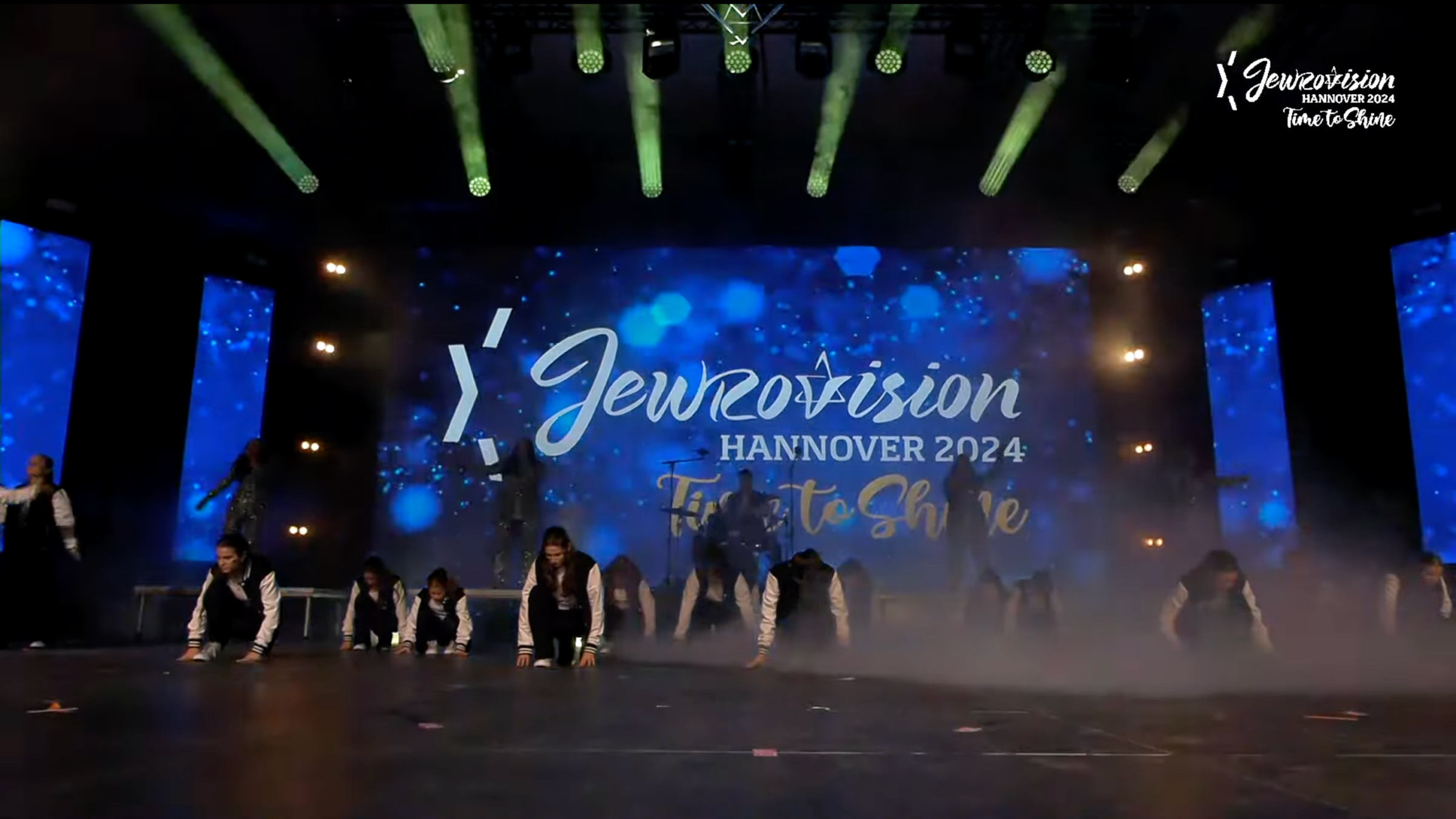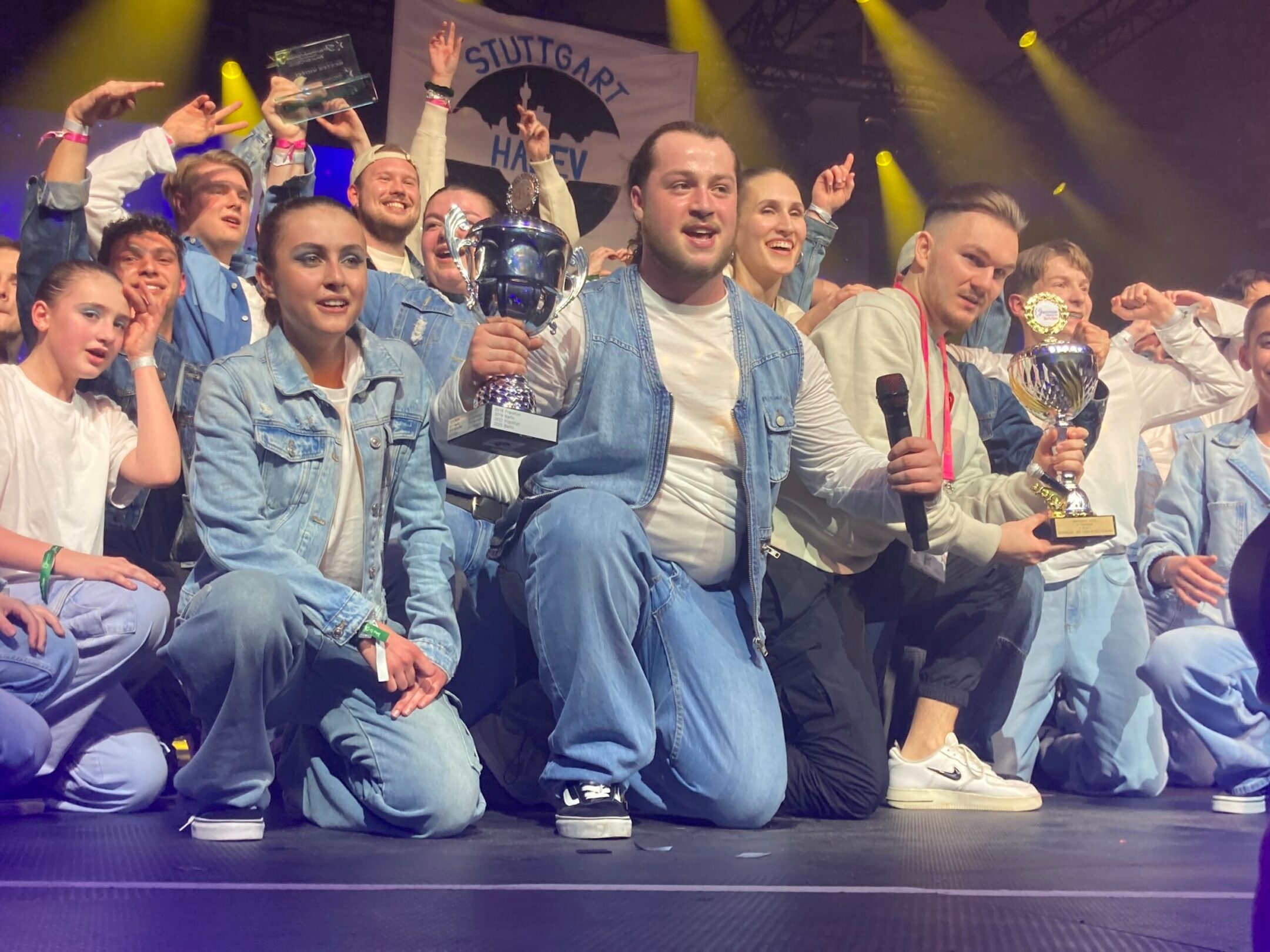Before Eden Golan sang at Eurovision, Jewish teens from across Germany performed at Jewrovision
For the last two decades, Jewrovision has annually convened what’s thought to be the largest Jewish youth event in Europe

The 2024 Jewrovision competition, which took place in Hannover, Germany, on March 31, featured Jewish teens in a song and dance competition. (Screenshot)
HANNOVER, Germany (JTA) — A succession of musical acts, performed by elaborately costumed crews each representing a different place. An auditorium packed with screaming fans on the inside, and dense with security outside. A winner to reign for the next year.
No, this isn’t Malmö in May, where the Eurovision Song Contest is underway amid tension over Israel’s participation. It was instead Hannover on Easter Sunday, when Jewish children and teens from across Germany gathered for a different music competition: Jewrovision.
For the last two decades, Jewrovision has annually convened what’s thought to be the largest Jewish youth event in Europe, when local youth clubs adapt pop songs — or, occasionally, write their own — to demonstrate their pride in being Jewish, then perform them with elaborate choreography and costumes.
The event has always been a respite and point of connection on a continent where antisemitism is considered a fact of life and Jewish teens can easily feel isolated. But this year, amid the Israel-Hamas war and the backlash it has engendered, the program felt even more essential for the youth groups that made the trek from across Germany to compete and cheer on their friends.
“It is so important, especially during times like these, to show the world that Jews in Germany stay together, are strong together,” said Joelle Abaew, 17, from Berlin, one of three hosts of the event. “We’re not being brought down by what is currently happening in the world.”

The team from HaLev Stuttgart won the 2024 Jewrovision competition. (Toby Axelrod)
Outside the arena, dozens of uniformed police, some on horseback, kept an eye on the venue. Security, already tight for Jewish events, had been increased after the ISIS attack on a concert in Moscow.
Inside, cares were thrown to the wind. The atmosphere was a combination of summer camp and international talent show. Big video screens flanked the stage, and jets of sparks shot up to punctuate each performance. In addition to the 13 youth teams, special guests took to the stage: the rising German pop star Mike Singer, and the Togolese-Israeli hip-hop sensation Stephane Legar.
“I’m so happy to see everybody smiling,” Legar told the crowd in a quiet moment in his otherwise frenetic set. “You know we’re going through something really hard right now, what’s going on in Israel. I’m happy to see everybody, all of us, still strong.”
When, finally, the first act took to the stage, there was a brief hush. And then — cheers and whoops. Each group produced a video with a message, followed by an act featuring song and dance pegged to the “Time to Shine” theme.
“We are people, we come together as equals, nobody is born evil,” sang the kids from Gelsenkirchen,
“Hate speech on German streets, it’s nothing new — hating Jews? Normal,” sang the team from Nuremberg. “We hate it! We have to change things: But we can’t do it alone. Are you with us?”
The winning team, from Stuttgart, focused on diversity: “Whether Jew or Muslim, Black or white … who cares? One thing is clear — we are people!”
Some of the videos and performances departed from the sunny theme and general spirit of the show. Multiple teams focused their performances on the plight of the Israeli hostages in Gaza, and the team from Emuna Dortmund’s video dramatized the granddaughter of a Holocaust survivor experiencing antisemitism in school and on social media, ranging across far-right, anti-Israel and classical Christian themes. “Hatred of Jews has always existed,” her grandmother tells her. “But we remain strong.”
The video from Jujuba, Baden’s Jewish youth group, began with a child alone, asking: “Did I do something wrong?”
Like Jewish teens everywhere, “the children and young people have a new reality of life here in Germany since Oct. 7,” Rebecca Seidler, head of Hannover’s liberal Jewish community, who attended Jewrovision with her two teenage sons, told the Jewish Telegraphic Agency.
Kids are sometimes “blamed for the situation in Israel,” she said. “They quickly find themselves in a defensive and justifying position and sometimes they are really excluded from the class.”
“They have lost friendships, they have experienced hostility, they have felt lonely and in doubt. All of this became very clear in the contest presentations,” she added. “They really needed this place for empowerment, to feel a sense of unity, to feel that they are not alone, but that the entire Jewish family is behind them.”
The event, which caps a four-day youth convention, is sponsored by the Central Council of Jews in Germany. “After Oct. 7, the feeling for every Jew all over the world is strange,” the council’s chair, Josef Schuster, told JTA as the festivities began. “To have this feeling to be together, to be one, is very good — especially this year.”
Samuel Markusevics, from Saarbrucken, came to Jewrovision to root for his friends and “to make my bond stronger” with the Jewish community. He and a friend held up a banner as the crowds of children, parents and counselors mingled and made their way to their folding chairs.
Having just started college, Markusevics said he feels a bit lonely. “But when I come here, I see my friends who are spread all over the world.”
Jewish youth need such “empowerment hubs,” said Marina Chernivsky, founder and director of OFEK, the first counseling center in Germany that specializes in antisemitism and community-based counseling for victims.
“Jewish children here in the Diaspora do not have the experience of the majority and are not protected,” she said, adding that they need “places where Jewish children can be in the majority, where the balance of power is different than what they otherwise know in their lives. And that is indirectly, not just directly, really a huge contribution to Jewish identity.”
“My own child came home after Jewrovision completely different,” added Chernivsky. “Without me talking to her about it, she said she was going to make sure that they also celebrate Jewish holidays at her school… She spoke more about ‘we,’ and more about the future.”
For her part, Chernivsky’s daughter, Leah, 11, seemed to be channeling the excitement of the event, and not the challenging realities it laid bare.
“The best thing about it for me was that I got to spend time with my friends and be on stage,” Leah said by phone after the event. “It was really, really fun, and I was sad to leave, but also really happy to come back home.”
This article originally appeared on JTA.org.
A message from our Publisher & CEO Rachel Fishman Feddersen

I hope you appreciated this article. Before you go, I’d like to ask you to please support the Forward’s award-winning, nonprofit journalism so that we can be prepared for whatever news 2025 brings.
At a time when other newsrooms are closing or cutting back, the Forward has removed its paywall and invested additional resources to report on the ground from Israel and around the U.S. on the impact of the war, rising antisemitism and polarized discourse.
Readers like you make it all possible. Support our work by becoming a Forward Member and connect with our journalism and your community.
— Rachel Fishman Feddersen, Publisher and CEO





























